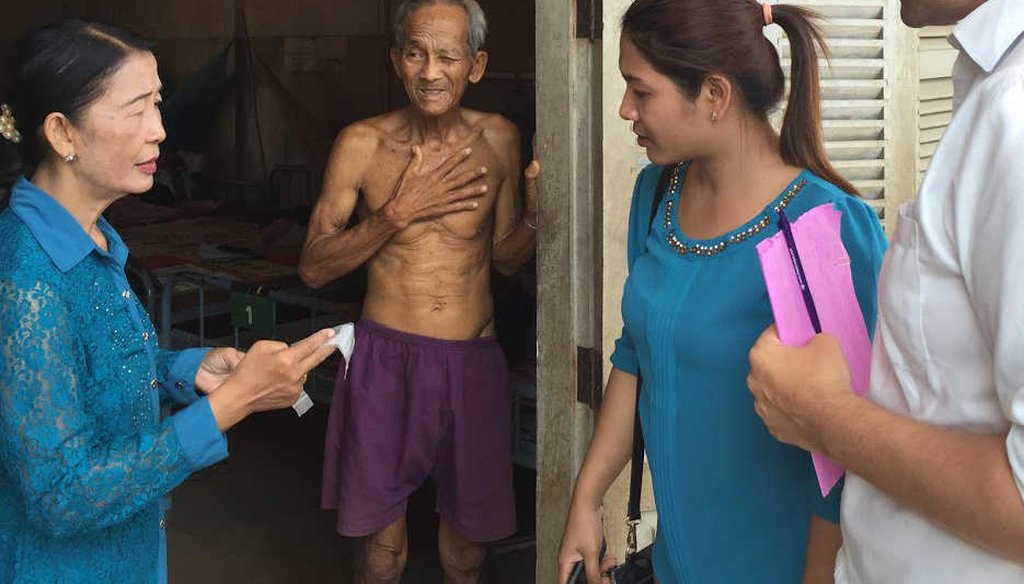Stand up for the facts!
Our only agenda is to publish the truth so you can be an informed participant in democracy.
We need your help.
I would like to contribute

Team members from the Tuberculosis Control in Cambodia Programme conducting fieldwork in Cambodia. (Screenshot)
We’re thinking of Singapore on this World Health Day. Relative to its size, the Southeast Asian island city-state popped up at the top of the charts for its spending on new ways to spot and treat tuberculosis.
The respiratory disease is second only to AIDS as the world’s deadliest infectious killer. In 2014, an estimated 1.5 million people succumbed to TB, and over 9 million new people caught it.
Singapore is not a hotbed of infection, but it is in a region where prevalence is high. Countries such as Cambodia and Indonesia have rates in the neighborhood of 400 cases per 100,000 people. That’s about ten times the rate in Singapore, and for the record, well over 100 times the rate in the United States.
A couple of recent claims from a South African-based AIDS activist drew our attention to tuberculosis research and development. Marcus Low, with the advocacy group Treatment Action Campaign, urged a United Nations panel meeting in Johannesburg to pressure all countries to invest more in TB. The disease is particularly lethal for people who are HIV positive.
Low said that the U.S. National Institutes of Health spends more on TB research and development than any other single source. That’s accurate. Based on the best survey of who spends how much, the NIH ranks #1 in raw dollars, over $200 million in 2014. Throw in the other federal agencies that invest in TB research and the total approaches a quarter of a billion dollars.
But countries with big economies have more financial wiggle room, and we wondered how the rankings would look if you factored in GDP and population. Here’s what we found:
It’s not entirely clear why Singapore punches above its weight. If we learn more, we’ll update this story.
Low also highlighted that the research money coming from pharmaceutical companies was a relatively modest $100 million. Our partners at Africa Check ran those numbers down and found that private industry lags behind governments worldwide by a four-to-one margin. For that matter, philanthropies are outspending the pharmaceutical firms.
Richard Chaisson is director of the Center for Tuberculosis Research at the Johns Hopkins University.
"Pharma has had no interest because the disease primarily affects poor people in poor countries, so the prospects of a blockbuster drug are low," Chaisson said.
This investment strategy isn’t necessarily specific to tuberculosis. Audrey Jackson, a senior fellow at the Center for Strategic and International Studies in Washington, D.C., told us that in recent years, the drug companies have moved away from the infectious disease area in general.
"Antibiotics are not as an attractive area of investment as chronic disease," Jackson said. "If you develop a drug that someone takes for a lifetime, you will do better than with a drug they take for a few months and get cured."
On a final note, the World Health Organization estimates that to get ahead of TB, the world needs much more research. Public health workers need faster and cheaper ways to diagnose the infection, treat it, and ultimately, prevent it through a vaccine. The global investment is about $675 million today. The World Health Organization says about another $1.3 billion annually is needed.
Our Sources
Africa Check, Pharma funding for TB research four times less than government funding, April 6, 2016
PolitiFact Global News Service, U.S. dominates global TB research spending (in one key way anyhow), April 5, 2016
Treatment Action Group, 2015 Report on Tuberculosis Research Funding Trends, 2005–2014: A Decade of Data, November 2015
National University of Singapore, Singapore in a prime position to lead fight against tuberculosis, March 24, 2016
World Health Organization, Tuberculosis data
World Health Organization, Global tuberculosis report, 2015
Interview, Mike Frick, project officer at the Treatment Action Group, March 31, 2016
Interview, Audrey Jackson, senior fellow, Global Health Policy, Center for Strategic and International Studies, March 31, 2016
Email interview, Dick Chaisson, founding director of the Center for TB Research at the Johns Hopkins University, March 30, 2016
Email interview, Marcus Low, director of policy, Treatment Action Campaign, March 31, 2016
















































